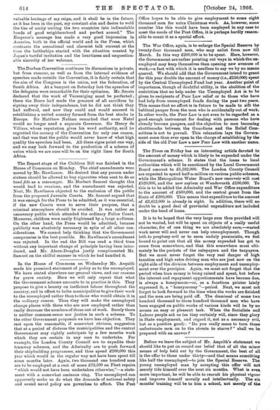In the House of Commons on Wednesday Mr. Asquith made
his promised statement of policy as to the unemployed. We have stated elsewhere our general views, and our reasons for grave anxiety. Here we will only repeat that what the Government scheme amounts to in practice is this. They propose to give a bounty on inefficient labour throughout the country, and in effect to bribe municipalities to give their work to the unemployed rather than to those who would obtain it in the ordinary course. Thus they will make the unemployed change places with those who are now employed rather than really decrease the numbers of those out of work. Surely there is neither common-sense nor justice in such a scheme. To the other Government proposals we have less objection. They rest upon the reasonable, if somewhat obvious, suggestion that at a period of distress the municipalities and the central Government may rightly anticipate by a few months work which they are certain in any case to undertake. For example, the London County Council are to expedite their tramway schemes, and the Admiralty are to push forward their shipbuilding programme, and thus spend 2200,000 this year which would in the regular way not have been spent till some months later. Again, two thousand one hundred men are to be employed at a cost of some £73,500 on Fleet repairs "which would not have been undertaken otherwise,"—a state- ment with a somewhat ominous ring. The unemployed can apparently make us do what the demands of national safety and sound naval policy are powerless to effect. The Post Office hopes to be able to give employment to some eight thousand men for extra Christmas work. As, however, some number like this would have been employed in any case to meet the needs of the Post Office, it is perhaps hardly reason- able to count it as a special effort.














































 Previous page
Previous page